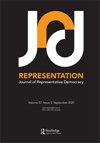Quota Effects Moderated by Descriptive Gender Representation Within Legislatures: A Cross-national Analysis
Q2 Social Sciences
引用次数: 1
Abstract
ABSTRACT This study revisits the links between gender quotas and gender egalitarian outcomes by focusing on the role of gender representative legislatures. Specifically, it investigates whether gender quotas have a substantive and symbolic effect on societal outcomes, and whether the link is moderated by women’s descriptive representation changing over time. This study sheds empirical light on both outputs (or process) and outcomes (or impact) of a quota policy and offers insight into pathways by which increased women’s representation within legislatures reinforces or weakens the effect of the quota policies. The panel data analysis drawn from 169 countries over the recent three decades (1990-2017) reveals a significant interactive effect of quotas and women’s representation in legislatures, suggesting that quotas’ societal impact increases as women’s representation increases, but with diminishing returns to a certain point. The findings corroborate the 30% level to which gender quotas as a policy tool significantly impact women’s political empowerment and raise questions on the validity of the critical mass argument in the political setting.立法机构内描述性性别代表性调节的配额效应:一项跨国分析
本文章由计算机程序翻译,如有差异,请以英文原文为准。
求助全文
约1分钟内获得全文
求助全文
来源期刊

Representation
Social Sciences-Sociology and Political Science
CiteScore
3.50
自引率
0.00%
发文量
31
期刊介绍:
This change in scope follows two paths. Firstly, it seeks contributors who are interested in exploring the interface between democratic practice and theory. In particular, this focus seeks contributions that apply theoretical insights to actual examples of current practice. Secondly, while not neglecting the current focus of the journal, we would like to expand its international coverage so that the journal will offer our readers insights in the state of democracy worldwide.
 求助内容:
求助内容: 应助结果提醒方式:
应助结果提醒方式:


